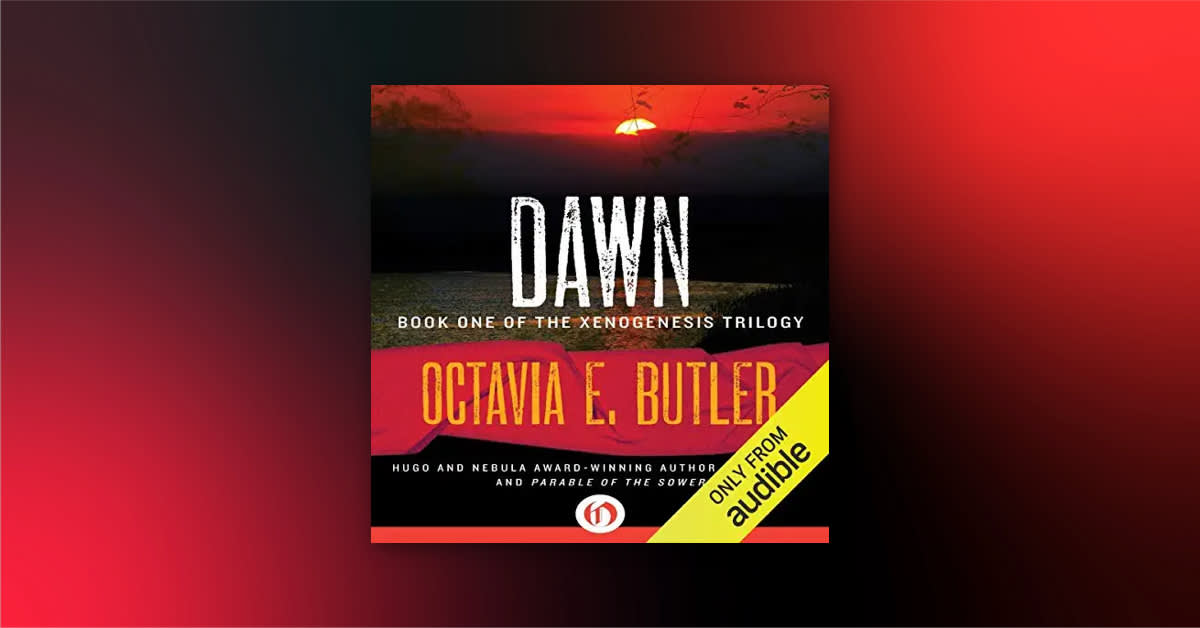Octavia E. Butler was a renowned Black author who wrote in, and arguably revolutionized, the science fiction genre. Her body of work, including such acclaimed novels as Kindred and Parable of the Sower, is lauded for its trenchant social commentary and continued pertinence well beyond its original publication.
Butler’s self-penned author description in an early edition of Parable of the Sower gives us a great picture of the person she was: “Who am I? I am a forty-seven-year-old writer who can remember being a ten-year-old writer and who expects someday to be an eighty-year-old writer. I am also comfortably asocial, a hermit in the middle of Los Angeles. A pessimist if I’m not careful, a feminist, a Black, a former Baptist, an oil and water combination of ambition, laziness, insecurity, certainty, and drive.”
Not only can we take Butler’s words at face value to understand her devotion to writing and her personality and beliefs, but we can also see the sharpness and incisiveness—even in this small sample paragraph—that characterizes her work.
Octavia Butler's Early Life and Career
Octavia Estelle Butler was born in Pasadena, California, on June 22, 1947. Her parents were Octavia M. Guy and Laurice Butler, though her father passed away when she was a young girl. Raised by a working mother, Butler witnessed from a young age the quiet heroism of survival, as her mother endured cruel treatment from white employers whose homes she cleaned. Though she may not have understood the grace and courage of this as a child, these events certainly inspired Butler’s worldview and writing later on.
A shy child, Butler spent much of her time reading at the Pasadena Central Library, where she eventually gained an interest in science fiction in particular. As she mentioned in many interviews, she was moved to begin writing science fiction after seeing the movie Devil from Mars when she was 12 and deciding she could come up with a better story. What resulted was the beginnings of a story that would later become the foundation for her Patternist series.
Despite being told by her aunt that Black people could not become writers, Butler persisted in pursuing her dream, continuing to write through junior high, high school, and beyond. Butler attended Pasadena City College, where she won a school-wide short story contest as a freshman. It was also at PCC that the seed for a story, which would eventually become her novel Kindred, was planted in Butler’s mind. A classmate who was actively involved in the Black Power Movement was very vocal in criticizing older Black generations for being silent and submitting to white people in power. This led Butler to think back on her mother and the choice she made to bear through persecution in order to raise her daughter and survive.
After receiving her associate’s degree, Butler supported herself with a series of temporary blue collar jobs, keeping up with her writing by waking up at around 2 a.m. most days. She befriended science fiction writer Harlan Ellison when taking a class of his at the Writer’s Guild of America's Open Door Workshop. Impressed by Butler’s work, Ellison suggested she attend the Clarion Science Fiction Writers’ Workshop, which became a huge stepping stone in Butler’s career. At the workshop, she met Samuel R. Delaney, who would become another mentor and also sold her first stories. "Crossover” went to Clarion Journal and was published in 1971, and “Childfinder” was purchased by Ellison for an anthology, which unfortunately did not end up being published.
Octavia Butler’s Impact and Legacy
Five years after the publication of her first story, Butler published her first novel, Patternmaster. From there, her writing career continued on an upward trajectory, establishing of her voice as a leading Black woman writer in science fiction.
Over the years, Octavia Butler was the recipient of many awards and accolades for her work, including Nebula, Hugo, and Locus Awards, as well as a MacArthur "Genius" Grant and a PEN America Lifetime Achievement Award. But all this well-deserved recognition hardly manages to capture her deep and lasting legacy on science fiction literature.
Butler was keenly aware of her position as a Black woman in a genre dominated by white men and worked deliberately to fill the wide gaps present in the world of science fiction. Her work has been tied to the beginnings of Afrofuturism as well. She wrote herself into her stories, almost always writing from the perspective of a Black woman, and boldly confronted issues of race, gender, and power head on. Butler’s writing demonstrates exceptional foresight and awareness, which is why her stories remain incredibly relevant and influential to this day.
Butler died in 2006 at only 58 years old. Though we continue to mourn the loss of a literary great, there is great solace in knowing that the legacy she left behind is nothing short of eternal.
The Five Best Octavia Butler Audiobooks
You can’t go wrong starting with Kindred, arguably Butler’s most popular and widely enjoyed book. Though first published in 1979, the story is still wildly relevant. It's set in 1976, where Dana, a Black woman living in Los Angeles, suddenly finds herself being transported back and forth between her own time and place and a plantation in pre–Civil War Maryland. In the past, Dana meets her ancestors and becomes involved with the plantation community. There, she must learn to survive each of her stays to make it back to her life in present.
Through Dana, a woman who understands the lasting legacy of slavery in the 20th century, the novel explores the complex relationships between the enslaved and their enslavers, as well as the intersections of race, gender, and power dynamics. The time travel element is also a relatively light science fiction conceit, making Kindred an accessible listen even for those newer to the genre. Kim Staunton effectively transports the listener through time and space with her otherworldly narration.
One could simply sum up Fledgling as a vampire story—but given the genius of Octavia Butler, this is no vampire story like any you’ve heard before. The Ina are Butler’s unique version of the bloodthirsty creatures that form special symbiotic relationships with humans. Shori is a 53-year-old Ina, though she has the appearance of a Black preteen girl. At the beginning of the novel, Shori wakes up with major injuries and no memory of who—or what—she is, and the listener learns about the Ina alongside her. Unafraid of getting into uncomfortable territory, the novel digs into race, sexuality, and societal structures with Butler’s incomparable nuance and awareness.
Narrator Adenrele Ojo brings this fascinating story to life. Like Kindred, Fledgling is a standalone novel, so together these picks make a perfect one-two punch for listeners starting out with Butler’s works who aren’t yet quite ready to commit to one of her series.
In a staggering example of the potential prescience of science fiction, Parable of the Sower is the first in a duology that centers around issues of climate change and corporate greed. Lauren Oya Olamina is a young Black woman living in 2020s Los Angeles, where the deteriorating environment and growing wealth gap threaten to push society toward total collapse. Lauren, gifted with the ability of “hyper-empathy,” feels the pain of others. She creates her own belief system based on the idea that “God is Change,” which eventually becomes a new religion called Earthseed.
Lauren journeys north after being forced to leave her home, meeting various people along the way and sharing her religion with them. This is an epistolary novel, presented through Lauren’s journal entries, and Lynne Thigpen’s narration brings an added level of intimacy. The sequel, Parable of the Talents expands on the development of Earthseed against the backdrop of a dystopian United States that is eerily and alarmingly close to our current world.
Narrator Janina Edwards lends her voice to this next pick, a collection of Octavia Butler’s short stories. Butler’s talent certainly wasn’t limited to full-length novels, and she had a mastery in the short form as well, packing just as much of a punch into shorter pieces as she did in her novels. At just over five and a half hours long, this Audible-exclusive edition of Bloodchild and Other Stories is a quick listen, but certainly doesn’t fail to demonstrate the brilliance of Butler’s writing or the breadth of the topics she examines.
In the titular story “Bloodchild,” humans have escaped Earth and settled on a planet inhabited by insect-like creatures called the Tlic. The Tlic and the humans form a unique relationship, with the Tlic protecting the humans in exchange for having the humans act as hosts for their eggs. The procedure isn't always harmless.
Last but certainly not least, Dawn is the first in Butler’s Xenogenesis trilogy about the fallout of nuclear war and the complex relationship humans form with an alien species. Lilith Iyapo awakens under the care of the Oankali, an alien race that has rescued the few humans who survived the nuclear war that wiped out Earth. The Oankali have worked to make Earth habitable again and enlist Lilith to help them prepare the other surviving humans to return to their planet, which has been significantly changed. Lilith finds herself caught between the two species as the Oankali reveal exactly what they want from the humans in return.
The Xenogenesis series is a prime example of Butler’s ingenuity in using hard science fiction as a vehicle to discuss extremely relevant social issues like race, gender, sexuality, and coercion. The gifted Aldrich Barrett narrates all three volumes of this unforgettable series.









